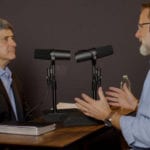The Pastor’s Toolkit is an ongoing series of practical resources for pastors, particularly focused on preaching and leadership. Find even more resources for pastors at our TGC Pastors page.
This is an easier question to ask than answer. It’s tempting to reply with the time-honored standard of “15 hours” and move merrily on our way. But sermon preparation, expository or otherwise, defies simple calculations. It blends both science and art, and is ignited by the exhilaratingly unpredictable combustion of God’s active presence.
It’s like the lad who asks the seasoned fisherman, “How long does it take to catch a fish each week?” The experienced angler pauses, knowing the question defies an easy answer because every cast contains elements entirely beyond his control. Fishing may be his weekly routine, but there is nothing routine about catching fish.

Preaching prep is no different. The time allotted to develop sermons becomes a blending of proficiency and providence, of work and wonder; we must live in the tension between our well-ordered rhythms and variables not entirely controllable.
How Do We Quantify?
But that’s not to say it’s impossible to quantify. If you’re the appraising type, here are some things you need to know to start your guestimates.
Sermon preparation time is determined by the preacher’s experience, gifts, study, notes, and soul.
1. Your experience.
There’s a world of difference between year twenty and year two in preaching. As you live in the weekly rhythms of sermon preparation, you’ll grow in your grasp of and skill with the tools of the trade: familiarity with the Bible’s storyline, streamlined study habits, an experienced eye for expository organization, and a well-tuned ear for illustration and application, just to name a few. And not to force your gaze toward Planet Obvious, but experience can reduce prep time.
2. Your gifts.
Let’s face it: like light bulbs, some gifts burn with a higher wattage. I say this because I’ve known and admired some high-watt preachers in my life. If you’re a guy who works with more mental firepower (intellectual capacity, mental clarity, recall ability, creative aptitude), sermon organization comes easier. This also means you get to your finished product quicker. If that’s you, then thank God right now. And pray for the rest of us.
3. Your study.
An expository series requires considerable up-front study. One benefit of this study is that, theoretically, you can retain some of it and carry it into the following week. And it does help. In an expository series, each week is not a fresh excavation into new contextual or authorial soil. You become conversant with the life situation behind the book, the human author, the big ideas, and the expositional flow.
The topical-only guys have a much harder field to plow each week, particularly if they’re earnestly looking to understand and unpack the text. And if they’re not, they may want to consider another vocation.
4. Your notes.
Converting what you’ve studied into preaching notes is an essential part of preparation. Gauging the amount of time to set aside depends on what you carry into the pulpit. More notes may mean more time. A manuscript guy generally dedicates more time to fashioning phrases, a “main-points-and-sub-points-only” preacher may spend less time in that phase. If you take the additional step of converting your manuscript to memory, block out more time.
And if you’re Dr. ‘I-just-study-and-deliver-with-no-notes’, find out whether anyone apart from you and your wife agrees that it’s resulting in clear and helpful exposition. Then come join us in the world of notes.
I’m kidding. Sort of.
5. Your soul.
Preaching includes prayer, or at least it should. Sometimes sermon prep takes longer because the preacher uniquely senses his need for God. Desperation becomes part of preparation. Preaching should also include time for meditation and reflection—marinating in the text. This discipline often gets lost due to insufficient time, or overlooking the need to sift your own soul through the text. In doing so, the preacher may conclude his life is a poor reflection of the message. Added to the preparation, then, is the nuancing of how to speak with integrity and lead in weakness. Alas, more time.
What’s the bottom line on the soul work? Preaching is not a service you provide, it’s an engagement with God’s Word that begins with you and then reverberates outward through the whole church.
But How Long?
If you have read this far and remain desperate for some kind of number, I’ll tell you my sermon preparation during an expositional series typically takes 10 to 15 hours. Sadly, these numbers are higher than they were in my maiden voyages from the preaching harbor, primarily because I set sail on a topical dinghy rather than an expositional battleship. If you’re like me, you discovered early that ignorance certainly reduces prep time. Ironically, it also lengthens sermons.
If preaching preparation sounds like a lot of work, then I’ve achieved an important goal for this piece. It is work—glorious, resplendent, awe-inspiring labor for both the lost and the found. But the strenuousness of the work isn’t debilitating when the One who calls you to it also empowers you for it and incites your delight in it.
“It is a privilege of privileges,” the recently departed but forever insightful Alec Motyer said, “to be driven to such involvement in the Word of God, to be required to buckle down to the precious Scriptures.” Yes indeed, but it is also demanding, frequently burdensome, rarely easy—and always, in the event, endlessly delightful.
Free eBook by Tim Keller: ‘The Freedom of Self-Forgetfulness’
 Imagine a life where you don’t feel inadequate, easily offended, desperate to prove yourself, or endlessly preoccupied with how you look to others. Imagine relishing, not resenting, the success of others. Living this way isn’t far-fetched. It’s actually guaranteed to believers, as they learn to receive God’s approval, rather than striving to earn it.
Imagine a life where you don’t feel inadequate, easily offended, desperate to prove yourself, or endlessly preoccupied with how you look to others. Imagine relishing, not resenting, the success of others. Living this way isn’t far-fetched. It’s actually guaranteed to believers, as they learn to receive God’s approval, rather than striving to earn it.
In Tim Keller’s short ebook, The Freedom of Self-Forgetfulness: The Path To True Christian Joy, he explains how to overcome the toxic tendencies of our age一not by diluting biblical truth or denying our differences一but by rooting our identity in Christ.
TGC is offering this Keller resource for free, so you can discover the “blessed rest” that only self-forgetfulness brings.


































